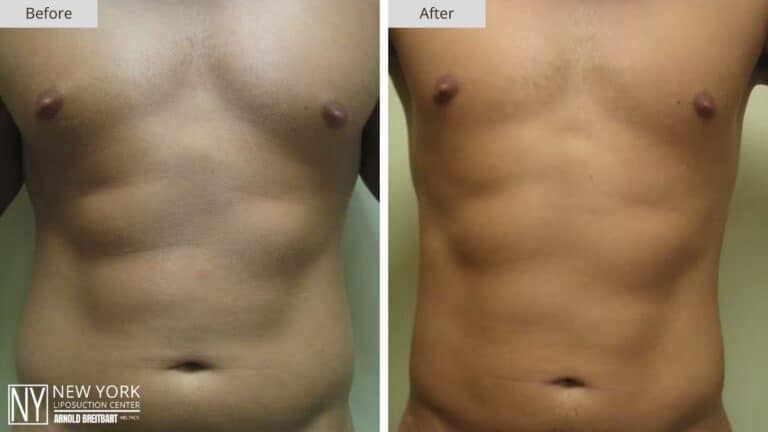Chest Liposuction in NYC
Chest liposuction surgery in New York City performed by board certified plastic surgeon Dr. Arnold Breitbart.
Does Chest Fat Affect Your Confidence?
You’ve tried every chest exercise and diet plan. Yet stubborn fat still accumulates around your chest, creates an uneven contour, or leads to a fuller chest appearance that makes you self-conscious in fitted clothing and at the beach.
Chest liposuction in NYC removes excess fat from the chest area to create a flatter, more defined contour. For men dealing with gynecomastia (enlarged male breasts), this procedure eliminates stubborn chest fat that doesn’t respond to exercise or weight loss. For women, chest liposuction targets fat around the breasts and underarm areas to enhance natural curves and create better proportion.
Dr. Breitbart and the New York Liposuction Center team understand how chest fat can impact your confidence and wardrobe choices. We help you achieve the chest definition you’ve been working toward.
What to Know About Chest Liposuction in New York
Chest liposuction removes excess fat deposits from the chest area to create a more sculpted, defined appearance. For men, this procedure primarily addresses gynecomastia by eliminating the fatty tissue that causes the chest to appear enlarged or feminine. For women, the treatment targets fat around the breast area and sides to enhance natural contours and improve overall chest definition.
Dr. Breitbart performs chest liposuction using advanced techniques tailored to the unique characteristics of chest tissue. The chest area contains dense, fibrous fat that requires specialized approaches like power-assisted or ultrasound-assisted liposuction for effective removal. Small incisions are made in discreet locations, and a thin cannula removes the unwanted fat while sculpting the chest to create natural masculine or feminine contours.
During your recovery, you’ll wear compression garments to support the healing process and help your skin contract smoothly over your new chest shape. As swelling decreases over the following weeks, your chest becomes flatter and more defined.
Take the first step toward the chest contour you want with a consultation.
Benefits of Chest Liposuction
Chest liposuction offers several benefits that can improve both your appearance and confidence:
Ideal Candidates for Chest Liposuction
Chest liposuction works best for people who have localized fat deposits but are already at or near their goal weight. Here’s who typically qualifies:

Male Breast Enlargement from Fat
You have gynecomastia caused primarily by fatty tissue rather than glandular tissue, which makes you an excellent candidate for liposuction alone without additional surgical excision.

Persistent Chest Fat Despite Exercise
You maintain a healthy lifestyle with regular chest workouts and cardio, but stubborn fat remains in your chest area and prevents the definition you’re working toward.

Good Skin Elasticity
Your chest skin has enough natural firmness to contract smoothly after fat removal, which helps you achieve tight, defined contours without loose or sagging skin.

Female Chest and Underarm Fullness
You’re a woman who wants to reduce excess fat around the breast area, sides, or underarms to create better proportion and enhance your natural curves.

Defined Chest Goals
You understand that chest liposuction removes fat and creates contour but doesn’t build muscle mass or replace the need for strength training to maintain chest definition.

Commitment to Weight Stability
You’re prepared to maintain your results through consistent healthy eating and exercise habits after your procedure to prevent remaining fat cells from expanding.
Dr. Breitbart will evaluate your candidacy for chest liposuction in NYC during your initial consultation.
A free liposuction consultation helps you understand your options and expected outcomes.
What to Expect During a Consultation at our New York Office
Your consultation begins with Dr. Breitbart examining your chest area to assess the amount and distribution of fat, evaluate your skin quality, and determine whether you have primarily fatty tissue or a combination of fat and glandular tissue.
Dr. Breitbart discusses your specific concerns about chest appearance and your goals for the procedure. He explains whether liposuction alone will achieve your desired results or if additional techniques might be needed. You’ll review what to expect during the procedure, how your recovery will progress, and see examples of results he’s achieved for patients with similar chest concerns.
Our practice provides detailed instructions for preparing for your chest liposuction procedure. We ensure you understand every aspect of the process from pre-operative preparation through final results, so you feel confident moving forward with your treatment.
How to Prepare for Your Chest Liposuction
Proper preparation helps your procedure and recovery progress smoothly:

Compression Vest
Purchase a properly fitted chest compression garment before your procedure date so it’s ready to wear immediately after surgery for optimal support.

Button-Front Clothing
Prepare several loose button-front shirts that won’t require pulling anything over your head, which makes dressing much easier while your chest is tender.

Elevated Sleeping Position
Arrange pillows to create an elevated sleeping position at about 30-45 degrees, which helps reduce swelling and keeps pressure off your chest during early recovery.

Recovery Supplies
Stock arnica tablets, ice packs designed for chest use, and any medications Dr. Breitbart recommends to manage swelling, bruising, and discomfort during healing.

Stop Blood Thinners
Discontinue aspirin, ibuprofen, vitamin E, fish oil, and any other supplements that thin your blood at least two weeks before surgery per specific instructions.

Transportation Arranged
Confirm that a responsible adult can drive you home after your procedure and stay with you for at least the first 24 hours of recovery.
Preparing properly for chest liposuction in New York helps ensure your recovery stays comfortable and on track.
Chest Liposuction Procedure Steps
Your chest liposuction procedure follows a careful sequence designed to remove fat while creating natural, defined contours.
Chest Liposuction Techniques
Different approaches exist for chest liposuction, and the right technique depends on your tissue characteristics and goals.
Traditional Suction-Assisted Liposuction
This established technique uses a cannula attached to suction to manually break up and remove chest fat. It works well for patients with softer, less fibrous chest tissue and provides good results when performed by an experienced surgeon.
The manual technique allows for precise control during sculpting. However, it requires more physical effort and may be less effective on the dense, fibrous tissue commonly found in male chests with gynecomastia.
Power-Assisted Liposuction
Power-assisted liposuction uses a cannula that vibrates rapidly to break up tough, fibrous fat more efficiently than manual techniques. This method works especially well for chest tissue, which tends to be denser and more resistant than fat in other body areas.
Power-assisted liposuction for chest treatment achieves excellent results with low complication rates. The vibrating motion reduces surgeon fatigue while allowing more precise sculpting and better fat removal from fibrous areas.
Ultrasound-Assisted Liposuction (VASER)
VASER technology uses ultrasonic energy to liquefy fat before removal, which makes it particularly effective for treating the dense chest tissue found in gynecomastia cases. The ultrasound energy selectively targets fat cells while preserving surrounding tissue like nerves and blood vessels.
This technique also promotes skin tightening through the thermal effect of the ultrasound energy. Ultrasound-assisted chest liposuction achieves smooth, well-defined results while helping the skin contract more effectively over the new chest contour.
Chest Liposuction Recovery Timeline
Recovery from chest liposuction in New York progresses through stages, though your timeline may vary based on the extent of treatment.
Days 1-3
You’ll experience tightness, soreness, and swelling across your chest during this initial period. Your compression garment provides essential support, and you should avoid raising your arms overhead or lifting anything heavy while keeping movement gentle and controlled.
Week 1
Bruising becomes most visible and swelling persists but gradually improves each day. You can perform light activities like walking and desk work, though you should continue avoiding upper body exertion and keep wearing your compression vest as directed throughout this week.
Weeks 2-4
Swelling decreases noticeably and your chest contour starts becoming more defined throughout this phase. You can gradually increase activity to include moderate cardio like brisk walking, and most patients feel comfortable returning to work if their job doesn’t require physical labor.
Weeks 4-6
Your chest continues refining as residual swelling resolves and treated areas settle into position. You can resume light resistance training for your lower body, but avoid chest exercises and heavy lifting until Dr. Breitbart clears you for full activity at your follow-up appointment.
3 Months
Your chest achieves most of its final contour at this stage, with any remaining minor swelling barely noticeable. The definition you’ve been waiting to see becomes apparent, and incision sites have faded significantly. You can resume all normal activities including full chest workouts without restrictions.
6 Months and Beyond
Your results reach their final appearance as all healing completes and tissue fully settles into the new shape. The fat cells removed during your procedure are gone permanently, so your improved chest contour lasts long-term as you maintain stable weight through healthy habits.

Dr. Breitbart’s Recovery Tips
Why Choose Dr. Breitbart for Chest Liposuction
Dr. Breitbart is a highly qualified expert with extensive experience in chest liposuction and body contouring procedures. He understands that chest tissue presents unique challenges because it contains dense, fibrous fat that requires specialized techniques for effective removal and natural-looking results.
His approach focuses on creating defined chest contours while maintaining natural proportion and symmetry for anyone seeking correction of excess chest fullness.
You benefit from his meticulous attention to detail when sculpting the chest area to avoid irregularities, depressions, or uneven contours that can occur with less experienced surgeons. His expertise with chest liposuction in NYC means he can address everything from mild chest fullness to significant gynecomastia while creating results that look authentically natural and enhance your overall upper body appearance.
Chest Liposuction Case Study
This 47-year-old male came to us wanting a more athletic, sculpted look. He was in good health and led an active lifestyle, but like many men his age, he struggled with stubborn fat across the chest, abdomen, and flanks.
These areas had become resistant to diet and exercise, and he was feeling frustrated that his effort at the gym was no longer showing the way it used to. He wanted to restore definition and confidence without looking overdone or unnatural.

Why SmartLipo Was the Right Fit
SmartLipo was an ideal choice for this case. It uses laser energy to gently liquefy fat before removal while also triggering collagen production in the skin. That means fat reduction and skin tightening in one.
This is especially helpful in the chest, where simple fat removal can sometimes leave behind loose or uneven skin if not addressed carefully.
How the Surgery Was Performed
The procedure was done in our office under local anesthesia with mild sedation. We made small, discreet incisions to access the chest, abdomen, and flanks.
The laser fiber was first used to break down fat and begin the skin tightening process. A fine cannula was then used to remove the melted fat while sculpting each area for a smooth, natural contour.
The chest was reduced and reshaped to appear flatter and firmer. The stomach and love handles were slimmed to enhance the patient’s waistline and reveal the muscle underneath. He returned home the same day and resumed light activity within a few days.
Results at Eight Months
Eight months later, this patient has a dramatically improved body contour. His chest is noticeably firmer. His abdomen is flatter and better defined. His waistline is more tapered, and the overall figure is balanced from top to bottom.
These results give him the kind of physique he had worked hard for but couldn’t fully reach on his own.
What Other Patients Can Take Away
This case shows how combining chest, abdominal, and flank liposuction in one procedure can create a more complete transformation.
SmartLipo helped this patient lose fat, tighten his skin, and feel proud of his body again. It’s a great option for men who want clear, natural-looking results with a relatively short recovery.
FAQs About Chest Liposuction
Here are the most common questions patients ask as they explore chest liposuction and what the process involves.
Schedule a Free Consultation
Fill out the form or at call us at (917) 809-7787 to schedule your free consultation with the New York Liposuction Center and get started on your liposuction journey.